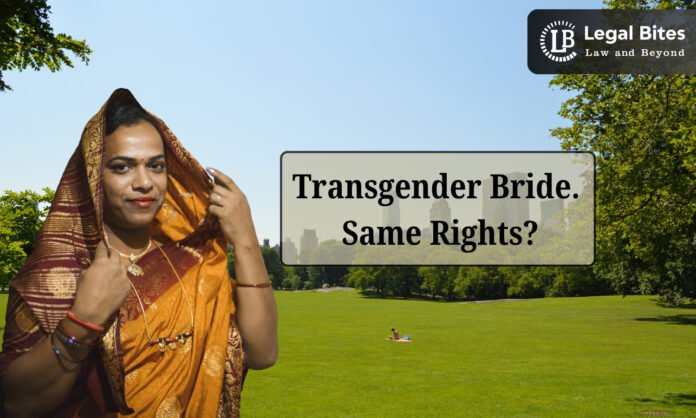The evolving landscape of gender identity in India continues to challenge entrenched norms in law and society. A critical question now being addressed by Indian courts is: can a transgender woman, legally recognised as female, invoke provisions under Section 498A of the Indian Penal Code (IPC), [now Section 84 of the Bharatiya Nyaya Sanhita (BNS)] against her husband and in-laws for domestic cruelty?
In a landmark ruling, the Andhra Pradesh High Court answered this question affirmatively in Viswanathan Krishna Murthy v. State of Andhra Pradesh (2025), upholding the right of a transgender woman to seek legal protection under domestic violence laws.
Background of the Case
In Viswanathan Krishna Murthy v. State of Andhra Pradesh, the complainant, Pokala Sabhana, a transgender woman, alleged domestic cruelty by her husband, Viswanathan Krishna Murthy, and his relatives. The couple had married under Hindu rites at the Arya Samaj in Hyderabad in January 2019, after entering into a Memorandum of Understanding. Despite the knowledge of her transgender identity, the accused married her, accepted dowry, and later abandoned her, subjecting her to psychological and emotional trauma.
Sabhana lodged a complaint under:
- Section 498A IPC (Section 84 BNS) (cruelty by husband or his relatives),
- Section 34 IPC [Section 3(5) BNS] (acts done by several persons in furtherance of common intention), and
- Section 4 of the Dowry Prohibition Act, 1961
The accused moved the High Court under Section 482 of the Criminal Procedure Code (CrPC) [now Section 528 Bharatiya Nagarik Suraksha Sanhita (BNSS)] seeking quashing of the proceedings on the ground that Sabhana, being a transgender person, could not be treated as a “woman” under Section 498A IPC.
Issue
- The primary issue before the Court was whether a transgender woman in a heterosexual marriage could be recognised as a “woman” under Section 498A IPC and thus be entitled to legal protection from domestic cruelty.
Court’s Analysis and Reasoning
[1] Self-Identified Gender and Legal Recognition
The Court relied on the landmark decision in NALSA v. Union of India [(2014) 5 SCC 438], which recognised the right of transgender persons to self-identify their gender. The Supreme Court held that transgender persons are entitled to the same constitutional protections as cisgender individuals under Articles 14, 15, 19, and 21.
[2] Statutory Framework: Transgender Persons (Protection of Rights) Act, 2019
Section 2(k) of the 2019 Act defines a transgender person as one whose gender does not match the gender assigned at birth, including trans-women. Importantly, the Act affirms that gender identity is not contingent upon medical or surgical intervention.
[3] Marriage Recognition in Case Law
The Court referred to Arunkumar v. Inspector General of Registration [AIR 2019 Mad 265], where the Madras High Court held that a marriage between a man and a transwoman is valid under the Hindu Marriage Act.
In Supriyo v. Union of India [2023 INSC 920], although the Supreme Court declined to recognise same-sex marriages, it clarified that transgender persons in heterosexual relationships have the right to marry under existing personal laws.
[4] Rebuttal of the Biological Argument
The Court rejected the argument that reproductive capacity defines womanhood. Such a view, it held, was discriminatory and contrary to constitutional guarantees. It reaffirmed that dignity and self-identification are the true basis for legal recognition.
[5] Maintainability of the Complaint
The Court concluded that since Sabhana, a transwoman, was in a heterosexual marriage and had valid documentation, she qualifies as a “woman” under Section 498A IPC. Therefore, her complaint was legally maintainable.
Key Highlights of the Case
Justice Venkata Jyothirmai Pratapa stated:
“In view of the foregoing discussion and the judgments referred to supra, this Court is of the view that, Respondent No.2, being a transwoman in a heterosexual relationship, cannot be deprived of her right to lodge a complaint against her husband or the relatives of her husband for the alleged offences. Therefore, the complaint lodged by Respondent No.2 in the present crime for the alleged offences, is maintainable.”
Outcome of the Case
Interestingly, while affirming the right of a transgender woman to invoke Section 498A IPC, the Court ultimately quashed the criminal proceedings against the accused. The Court found that:
- The allegations lacked specificity,
- There was no evidence of a demand for dowry,
- The complaint was vague and unsupported by prima facie evidence.
However, the Court emphatically stated:
“A transwoman/transgender, who is in a heterosexual relationship in marriage, shall have protection under Section 498-A IPC.”
Significance of the Judgment
This ruling is significant for several reasons:
- It affirms that legal gender identity is not tied to biological determinism.
- It ensures that transgender individuals in heterosexual marriages are entitled to protection against domestic violence.
- It aligns with constitutional principles of equality, dignity, and non-discrimination.
- It bridges the gap between gender identity and matrimonial rights in criminal law.
Conclusion
The Andhra Pradesh High Court’s judgment in Viswanathan Krishna Murthy v. State of Andhra Pradesh is a vital affirmation of the rights of transgender persons in India. It recognises their entitlement to legal remedies within the marital framework and ensures that protective laws like Section 498A IPC are interpreted inclusively.
This judgment is not only a victory for the petitioner but also a landmark in the ongoing struggle for legal equality for transgender citizens in India.

